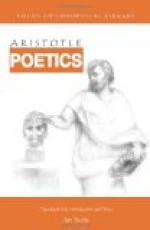Two parts, then, of the Plot—Reversal of the Situation and Recognition— turn upon surprises. A third part is the Scene of Suffering. The Scene of Suffering is a destructive or painful action, such as death on the stage, bodily agony, wounds and the like.
XII
[The parts of Tragedy which must be treated as elements of the whole have been already mentioned. We now come to the quantitative parts, and the separate parts into which Tragedy is divided, namely, Prologue, Episode, Exode, Choric song; this last being divided into Parode and Stasimon. These are common to all plays: peculiar to some are the songs of actors from the stage and the Commoi.
The Prologue is that entire part of a tragedy which precedes the Parode of the Chorus. The Episode is that entire part of a tragedy which is between complete choric songs. The Exode is that entire part of a tragedy which has no choric song after it. Of the Choric part the Parode is the first undivided utterance of the Chorus: the Stasimon is a Choric ode without anapaests or trochaic tetrameters: the Commos is a joint lamentation of Chorus and actors. The parts of Tragedy which must be treated as elements of the whole have been already mentioned. The quantitative parts the separate parts into which it is divided—are here enumerated.]
XIII
As the sequel to what has already been said, we must proceed to consider what the poet should aim at, and what he should avoid, in constructing his plots; and by what means the specific effect of Tragedy will be produced.
A perfect tragedy should, as we have seen, be arranged not on the simple but on the complex plan. It should, moreover, imitate actions which excite pity and fear, this being the distinctive mark of tragic imitation. It follows plainly, in the first place, that the change, of fortune presented must not be the spectacle of a virtuous man brought from prosperity to adversity: for this moves neither pity nor fear; it merely shocks us. Nor, again, that of a bad man passing from adversity to prosperity: for nothing can be more alien to the spirit of Tragedy; it possesses no single tragic quality; it neither satisfies the moral sense nor calls forth pity or fear. Nor, again, should the downfall of the utter villain be exhibited. A plot of this kind would, doubtless, satisfy the moral sense, but it would inspire neither pity nor fear; for pity is aroused by unmerited misfortune, fear by the misfortune of a man like ourselves. Such an event, therefore, will be neither pitiful nor terrible. There remains, then, the character between these two extremes,- -that of a man who is not eminently good and just,-yet whose misfortune is brought about not by vice or depravity, but by some error or frailty. He must be one who is highly renowned and prosperous,—a personage like Oedipus, Thyestes, or other illustrious men of such families.




